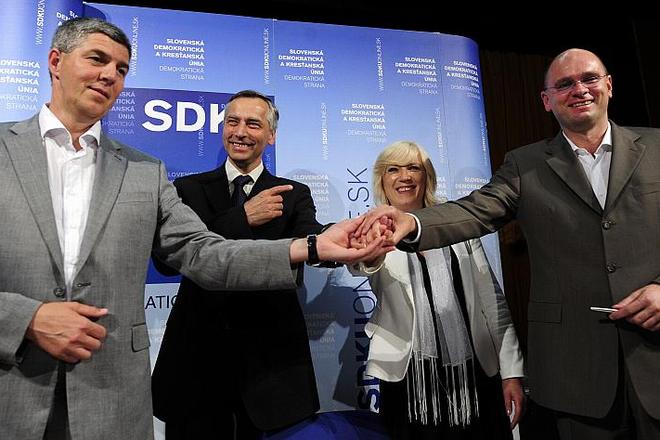Slovakia saw its leftist prime minister Robert Fico leave office and move into opposition after a general election held on June 12, 2010. His Smer party’s partner in government, the nationalist Slovak National Party (SNS), suffered the same fate. The coalition of four centre-right parties which emerged as the eventual winner from the election was expected not only to tackle Slovakia’s ballooning public-finance deficit, but also to address high-profile problems facing the judiciary, non-transparent behaviour by those in power and increasingly tense relations with neighbouring Hungary.
Although Smer won the largest share of the vote (34.78 percent) and hence more seats (62) than any other party, four centre-right parties collectively won eight seats more than Smer and SNS together. Prior to the election, all the centre-right parties had promised not to cooperate with Fico’s party.
The Slovak Democratic and Christian Union (SDKÚ) collected 15.4 percent of the vote and received 28 seats in the next parliament; it was followed by the greenhorn Freedom and Solidarity (SaS) party, with 12.14 percent and 22 seats. The Christian Democratic Movement (KDH) picked up 8.52 percent of the votes and 15 seats, followed by the new Most-Híd party with 8.12 percent of the votes and 14 seats.
The election turnout was 58.83 percent, slightly higher than in 2006, when 55 percent of eligible Slovaks cast their votes.
“Good morning Slovakia; it does seem that change is within reach,” said SDKÚ election leader Iveta Radičová the morning after the elections. Her prediction was borne out when she later became prime minister.
For the first time in its 12 years on the Slovak political scene, the Hungarian Coalition Party (SMK) failed to make it into parliament, after winning only 4.33 percent of the vote. The following day leader Pál Csáky and the entire SMK party leadership resigned.
Former prime minister Vladimír Mečiar, whose Movement for a Democratic Slovakia (HZDS) was part of the former ruling coalition along with Smer and the SNS, was also ejected from parliament after almost two decades in politics. The HZDS won only 4.32 percent of the vote.
“The HZDS has not lost; it is Slovakia’s loss,” the head of the HZDS national council Marián Klenko announced.
The post-election division of power saw the rise of some new names, as well as the continuing presence of more familiar ones: Iveta Radičová was appointed prime minister, while her predecessor and opponent Robert Fico exchanged his top executive post for a top parliamentary post, becoming one of the four deputy speakers of parliament.
SDKÚ chairperson and former prime minister Mikuláš Dzurinda, who stepped down as his party’s election leader to be replaced by Radičová, was appointed foreign minister. KDH leader Ján Figeľ became head of a new ‘superministry’, as it was dubbed by the media: a much-expanded Transport Ministry, which inherited some of the agenda of the defunct Construction Ministry. As such, it now coordinates the drawing of European funds for regional development. SaS chairperson Richard Sulík got the post of speaker of parliament, while Most-Híd leader Béla Bugár became one of the other deputy speakers.




 To the victors, the spoils: the four coalition leaders celebrate after their success. (source: TASR)
To the victors, the spoils: the four coalition leaders celebrate after their success. (source: TASR)